 Petzlover
Petzlover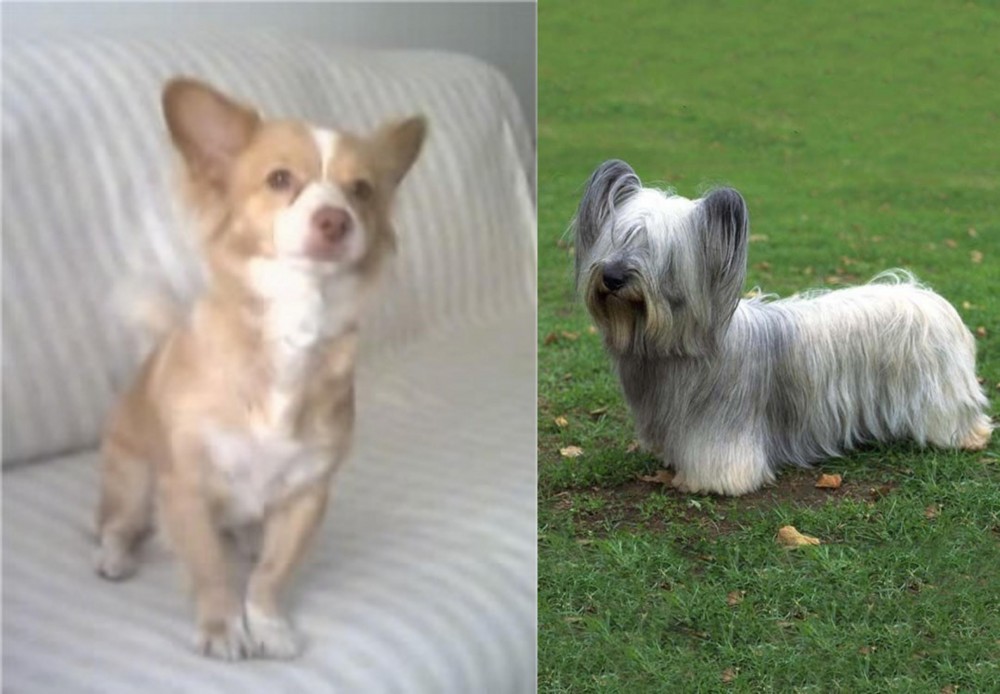 Alopekis is originated from Greece but Skye Terrier is originated from United Kingdom. Alopekis may grow 6 cm / 3 inches higher than Skye Terrier. Alopekis may weigh 12 kg / 27 pounds more than Skye Terrier. Both Alopekis and Skye Terrier has almost same life span. Both Alopekis and Skye Terrier has same litter size. Both Alopekis and Skye Terrier requires Moderate Maintenance.
Alopekis is originated from Greece but Skye Terrier is originated from United Kingdom. Alopekis may grow 6 cm / 3 inches higher than Skye Terrier. Alopekis may weigh 12 kg / 27 pounds more than Skye Terrier. Both Alopekis and Skye Terrier has almost same life span. Both Alopekis and Skye Terrier has same litter size. Both Alopekis and Skye Terrier requires Moderate Maintenance.
 The courageous Alopekis is said to have run with and fought with bulls. To this day they escort bulls in Greece. They were used by the Greeks to contain the vermin populations, guard the chickens and ducks, and assist larger dogs in working with sheep. At one time it was thought that they originated from breeding of dogs and foxes, but this proved not to be true. It was also once considered to be the same breed as the Small Greek Domestic Dog, but it has since been declared its own breed.
The courageous Alopekis is said to have run with and fought with bulls. To this day they escort bulls in Greece. They were used by the Greeks to contain the vermin populations, guard the chickens and ducks, and assist larger dogs in working with sheep. At one time it was thought that they originated from breeding of dogs and foxes, but this proved not to be true. It was also once considered to be the same breed as the Small Greek Domestic Dog, but it has since been declared its own breed.
The Alopekis is not a recognized breed with any of the current national or international dog organizations. The Kennel Club of Greece will recognize them once their population is large enough. They cannot be recognized by the AKC, IKC, or International groups until they are a much larger group.
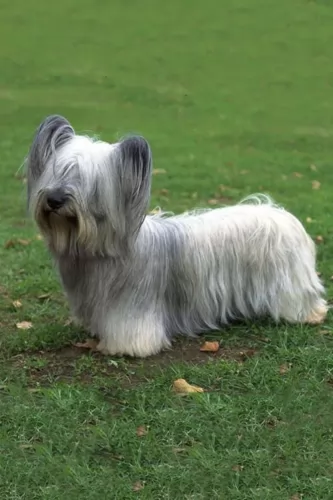 The Skye Terrier is a hardy dog breed and is actually considered to be an endangered native dog breed in the United Kingdom.
The Skye Terrier is a hardy dog breed and is actually considered to be an endangered native dog breed in the United Kingdom.
They were found on the Isle of Skye, although there is some confusion about its history. They were used long ago to hunt but these days they are essentially companion dogs.
They found their way to America and the Skye Terrier Club of America was founded in 1938. The American Kennel Club recognized the breed in 1887.
 The Alopekis is a small, fox-like dog with pricked ears on a head that is wedge shaped. They have large eyes, a deep and tapered muzzle with a broad nose. They are short but have long backs and a deep, wide chest with strong legs and feet. They have a beautiful tail that cures upward and a double coat.
The Alopekis is a small, fox-like dog with pricked ears on a head that is wedge shaped. They have large eyes, a deep and tapered muzzle with a broad nose. They are short but have long backs and a deep, wide chest with strong legs and feet. They have a beautiful tail that cures upward and a double coat.
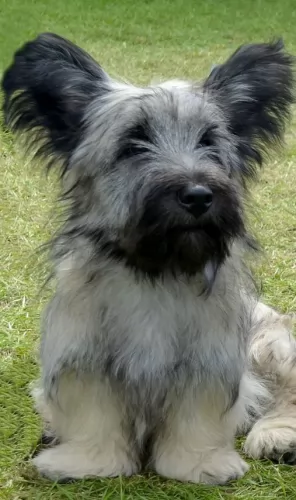 The Skye Terrier is a medium-sized dog standing at between 23 and 26cm in height and weighing between 12 and 18kg. The legs are short and sturdy. He is double coated with the top coat being straight and hard and forming a beard around the face area. The coat can be fawn, and in various shades of grey which are sometimes even black. The ears of the dog are medium sized and erect.
The Skye Terrier is a medium-sized dog standing at between 23 and 26cm in height and weighing between 12 and 18kg. The legs are short and sturdy. He is double coated with the top coat being straight and hard and forming a beard around the face area. The coat can be fawn, and in various shades of grey which are sometimes even black. The ears of the dog are medium sized and erect.
The Skye Terrier has always been a hunting dog and he enjoys quite a bit of exercise – walks, ball games as well as indoor games. Small though he may be, he is strong willed with a mind of his own and will benefit from being trained and socialized.
This is also necessary as he has a fairly reserved nature. He gets on well with children and makes an excellent family pet but he is ready to take on smaller pets in the home. He will bark when confronting strangers and makes an excellent watchdog too.
He is able to adapt well into life in the city or the countryside. He isn’t a dog to be left outside day after day and will just die of boredom, frustration and loneliness.
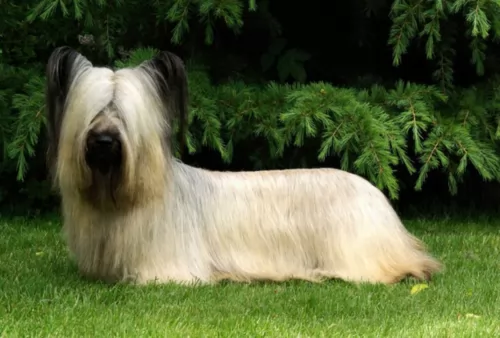 Give the Skye Terrier the attention he wants and he will reward you with his loving companionship.
Give the Skye Terrier the attention he wants and he will reward you with his loving companionship.
He loves the entire family but is best suited to homes where children have been taught to be kind to animals and to treat them with respect.
He has moderate energy levels and will expect you to give him a fair amount of exercise. The Skye Terrier can make an excellent companion for you and your family.
 The Alopekis is an endangered species of canine due to a variety of factors. Traditionally this has been a healthy gene pool and the breed has been an example of the evolution of small canines. Factors such as farm pesticides, urbanization and cross breeding have affected the breed’s future.
The Alopekis is an endangered species of canine due to a variety of factors. Traditionally this has been a healthy gene pool and the breed has been an example of the evolution of small canines. Factors such as farm pesticides, urbanization and cross breeding have affected the breed’s future.
This is made worse by the fact that the female Alopekis only breeds once a year, the litters are small, and the puppy mortality is high. In addition, the dogs are regularly neutered as part of a program to control strays, despite their status as an endangered species.
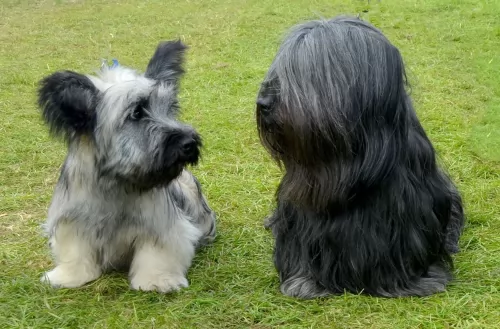 The Skye Terrier is a healthy dog breed. Perhaps the only issue that could be a problem with him is orthopedic problems. He is an achondroplastic dog, meaning a large body on small legs.
The Skye Terrier is a healthy dog breed. Perhaps the only issue that could be a problem with him is orthopedic problems. He is an achondroplastic dog, meaning a large body on small legs.
He could develop spinal problems if he were allowed to constantly be jumping off beds and high chairs.
Orthopedic problems affect the bones, muscles and joints and can actually be debilitating. Orthopedic conditions can be ligament tears or hip dysplasia for instance, accompanied by arthritis.
You’ll notice your dog has an abnormal way of walking or running, inability to get up once lying down and he may have arthritis and pain.Be careful because obesity can trigger problems with the joints and bones.
 This is a high energy dog and the puppies need to be fed a high-quality puppy food. Feed about 1/3 of a cup twice a day.
This is a high energy dog and the puppies need to be fed a high-quality puppy food. Feed about 1/3 of a cup twice a day.
Feed high- quality dry dog food and dog treats to this active dog. Feed about ¼ of a cup twice a day – more if below average weight and less if overweight.
Keep them active and away from pesticides if possible.
This is a very active dog that needs a lot of exercise, games and if possible – a job.
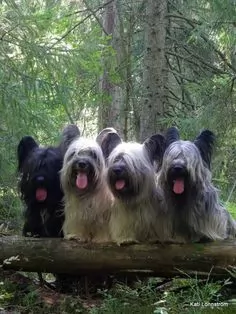 ● The coat of the Skye Terrier is long and silky and will most certainly require brushing every day if you keep the hair long. Such silky hair can easily become matted.
● The coat of the Skye Terrier is long and silky and will most certainly require brushing every day if you keep the hair long. Such silky hair can easily become matted.
● Little dogs like this will need their teeth being checked regularly. You can even try to buy special pet toothpaste and toothbrush and brush his teeth yourself. If you prefer, a professional dog groomer can do this for you and at the same time trim his nails and check his ears and clean the insides of the ears too to avoid infection.
● Provide him with top quality food as the quality of the dog food you buy makes a huge difference to his health and longevity. He is a small dog and there are some excellent commercially manufactured dog foods specially made for small, energetic dogs.
Try to include some home-made food for him which can be simply mixed into the dry kibble twice a week. Boiled chicken, brown rice or pasta and spinach, sweet potatoes and carrots is super tasty and nutritious. Ensure there is always a bowl of fresh, cool water within his reach.
● Keep his vaccines up to date against some deadly canine diseases, and get him to the vet when he shows signs of illness.